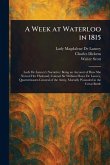"Napoleon's British Visitors and Captives, 1801-1815" by John Goldworth Alger offers a fascinating glimpse into the complex relationship between Britain and France during the Napoleonic Era. This historical account explores the experiences of British citizens who found themselves in France, whether by choice or circumstance, during a period of intense conflict and shifting Anglo-French relations. Based on meticulous research, Alger's work sheds light on the lives of prisoners of war and other British subjects caught within Napoleon's reach. It examines their challenges, adaptations, and interactions with French society. This volume presents a detailed portrait of a unique historical moment in the 19th century, revealing the personal stories behind the grand sweep of history. A valuable resource for anyone interested in European history, the Napoleonic Wars, and the lives of Britons abroad. This work has been selected by scholars as being culturally important, and is part of the knowledge base of civilization as we know it. This work is in the public domain in the United States of America, and possibly other nations. Within the United States, you may freely copy and distribute this work, as no entity (individual or corporate) has a copyright on the body of the work. Scholars believe, and we concur, that this work is important enough to be preserved, reproduced, and made generally available to the public. We appreciate your support of the preservation process, and thank you for being an important part of keeping this knowledge alive and relevant.
Bitte wählen Sie Ihr Anliegen aus.
Rechnungen
Retourenschein anfordern
Bestellstatus
Storno








